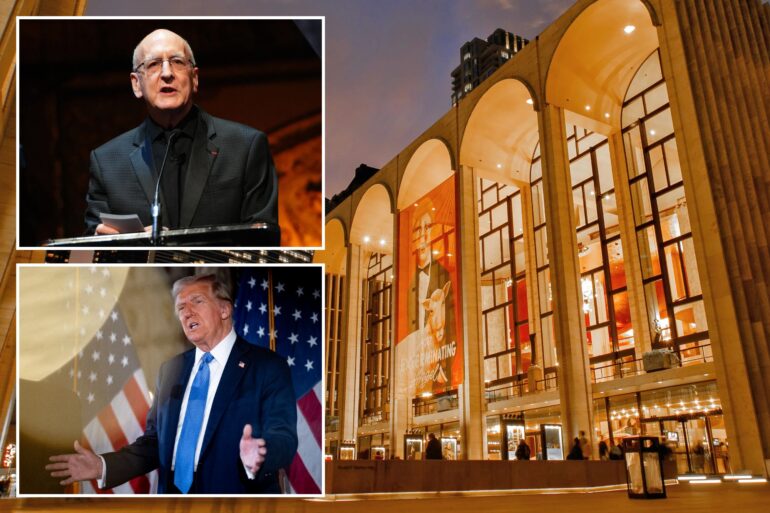🔴 Website 👉 https://u-s-news.com/
Telegram 👉 https://t.me/usnewscom_channel
Blaming the president is a popular pastime these days, but one of America’s cultural leaders has come up with something really novel in the genre.
“Metropolitan Opera season attendance dropped slightly following the Trump administration’s immigration crackdown that coincided with a decrease in tourists to New York.”
Who knew rounding up hardened illegal-immigrant criminals would hit the hallowed halls of the country’s most prestigious opera house hard?
That line is the first sentence of a June 13 Associated Press news report that takes as fact Metropolitan Opera general director Peter Gelb’s explanation for a slump in sales.
With the Met’s season over, Gelb has been making the rounds, pushing this narrative repeatedly in interviews and podcasts.
He even ripped the American president last week from a Kyiv stage, telling Ukrainians his government “no longer stands for some of democracy’s most basic principles.”
The Met matched its 2023-24 sales, at 72% of capacity — but had projected 75%.
“We were on track to continue to improve,” Gelb said. “I attribute the fact that we didn’t achieve our sales goals to a significant drop in tourism.”
That’s “a direct consequence” of Trump policy, Gelb told German outlet BackstageClassical.
He said New York saw 17% fewer tourists after President Trump took office, sighing to AP about “the times in which we live.”
Gelb’s international Blame Trump tour might make him more popular at Upper West Side cocktail parties (which he’s been attending for life: His father was New York Times managing editor Arthur Gelb).
But he should look closer to home to understand why he’s not seeing success at the storied institution he’s run for 18 years.
The impresario can’t help putting the political into his productions, even though audiences are anything but enamored of these new, woke operas.
And he needlessly canceled the company’s biggest star, Anna Netrebko — to make a political point he still crows about even as his decisions have been disastrous for the Met.
“Mediocre or even bad.” “Flop after flop of terrible productions.” “Just bad.”
Those are some of the judgments I can print in a family newspaper about Gelb’s recent runs from Reddit’s opera lovers.
“Gelb has had contempt for opera and his own artform since he started,” one declared in a thread with almost nothing positive to say about the manager.
“Grounded” opened this past Met season after a heavy revision from its 2023 Washington, DC, premiere.
The “antiwar opera,” as Gelb calls it, centers on an F-16 pilot grounded after she unexpectedly gets pregnant; on her return to the military, she’s still on the ground — going after human targets by manning drones.
“This isn’t an opera about the tragedy of war — its message is evil only comes from our side,” Post columnist Daniel McCarthy wrote in these pages.
Even with a September opening-night red-carpet gala — which the company trumpeted as “the first opera by a female composer ever to open a Met season” — ticket sales were sluggish: It was the worst-attended opera this season, selling just 50% of capacity.
Osvaldo Golijov’s “Ainadamar,” which Gelb described as “about the murder of the Spanish poet Federico García Lorca by the fascist forces of Franco, eerily mirroring the troubled world in which we live today,” sold just 61% of tickets.
What did sell?
A new production of Verdi’s “Aida” (82%), “Moby Dick” (81%) and Puccini’s “Tosca” (78%). Even Tchaikovsky’s “Pique Dame (The Queen of Spades)” — not one of the American stage’s most popular operas — sold 77%.
Those numbers — low for contemporary woke operas, high for great works — can be seen in every recent season.
Of course, the Met makes even the classics “relevant.” Last season’s “Carmen” updated the scene to present-day America. People buying pricey tickets to see beautiful sets and costumes up close were treated to singers in jean cutoffs.
Gelb took to the air on the June 7 live radio broadcast of the Tchaikovsky opera to declare he doesn’t want Russian artists “held hostage” to Vladimir Putin’s “villainous acts,” noting some on stage are Russian. “We want to cancel Putin, not Pushkin.”
It was a bit rich coming from the guy who brags of having personally “dismissed” the company’s biggest star, Netrebko, after Putin’s 2022 full-scale invasion of Ukraine.
He was gloating about the move just last week to Ukrainian journalists.
“When I arrived at the Met, Netrebko was just getting launched and I immediately saw that she was someone on whose career the Met could hang its hat,” Gelb has said.
Indeed, she headlined the moneymaking New Year’s Eve gala more than once; her Met performances frequently sold out.
The Russian soprano denounced Putin’s war, but Gelb didn’t care.
He’s never seen an opportunity to grandstand politically he hasn’t grabbed.
And he’s allowed on stage plenty of less-famous Russians who haven’t said as much as she has — sometimes even nothing — against the Ukraine war.
(Netrebko notes in her lawsuit against Gelb and the Met that the company’s continued to feature male singers who, unlike her, have appeared in Russia at Putin- and war-supporting events since the full-scale invasion.)
It’s opera lovers in New York and beyond who pay the price — along with the Met’s sliding sales.
Netrebko is still selling out European houses.
WQXR finally broadcast her work last month, with a production from Milan’s La Scala.
Listeners took to the comments in celebration and complaint.
Joe Pearce from Brooklyn — who happens to be the Vocal Record Collectors Society’s president — mourned “the remainder of her best years totally denied to us by a Met Opera manager who doesn’t seem to understand that he is running an opera company and not for political office.”
What will Peter Gelb do once Trump’s second term is over, having lost his raison d’être?

